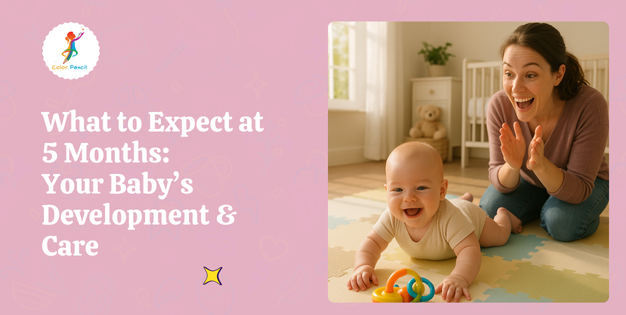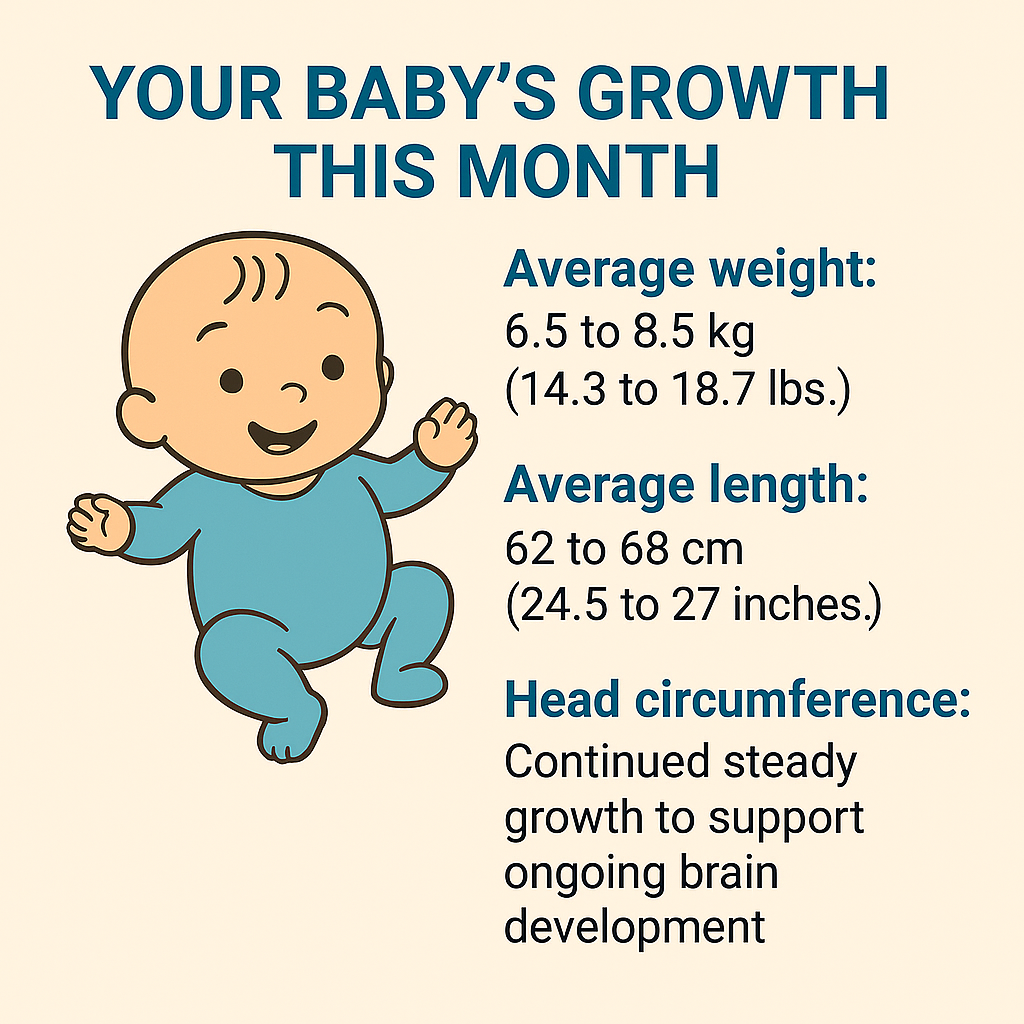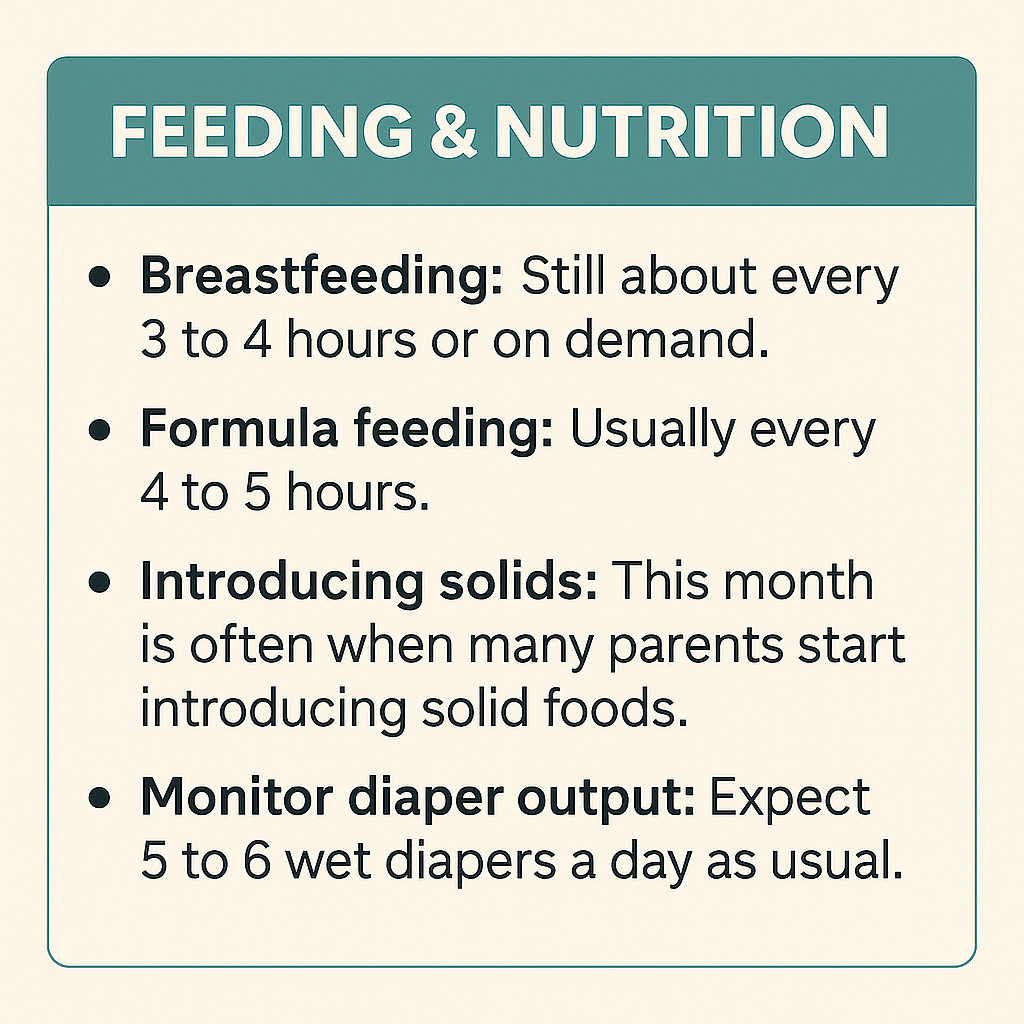Milestones, Growth, Sleep, Feeding, and Practical Tips for the Fifth Month
As your baby reaches the 5-month mark, the changes are becoming even more remarkable. Your little one is now gaining more control over their movements, becoming more aware of the world around them, and might even be showing some early signs of independence. Here’s what you can expect during this exciting month.
🍼 Your Baby’s Growth This Month
- Average weight: 6.5 to 8.5 kg (14.3 to 18.7 lbs).
- Average length: 62 to 68 cm (24.5 to 27 inches).
- Head circumference: Continued steady growth to support ongoing brain development.
Note: Growth rates can vary, so always consult with your pediatrician during check-ups.
👶 Developmental Milestones
At 5 months, your baby may show:
- Improved muscle control: They may be able to sit up with support or even attempt sitting unassisted for short periods.
- Rolling in both directions: Many babies will roll from tummy to back and back to tummy.
- Grasping and reaching: Your baby might be able to grab toys with both hands and hold onto them.
- Babbling and cooing: Expect to hear more varied sounds, including some vowel-consonant combinations.
- Social interactions: Your baby will be more engaged in social interactions, offering big smiles and laughs in response to familiar faces and voices.
🎯 Firsts to Watch For
- Sitting with minimal support.
- Rolling both ways: From tummy to back and back to tummy.
- Increased variety in vocalizations: Your baby will start experimenting with more sounds and might even mimic some noises you make.
- Recognizing their name: Your baby might respond to their name or show recognition when someone familiar enters the room.
🍽 Feeding & Nutrition
- Breastfeeding: Still about every 3 to 4 hours or on demand.
- Formula feeding: Usually every 4 to 5 hours.
- Introducing solids: This month is often when many parents start introducing solid foods. Signs of readiness include sitting up with minimal support and showing interest in your food.
- Monitor diaper output: Expect 5 to 6 wet diapers a day as usual.
🌙 Sleep Patterns
- Total sleep: 12 to 15 hours per day.
- Day naps: 3 naps are common, each lasting between 1 to 2 hours.
- Night sleep: Some babies may sleep for longer stretches at night (6-8 hours), but many will still wake at least once for a feeding.
- Sleep regression: Some babies may experience another sleep regression during this period, which can result in disrupted sleep patterns.
Tip: Continue maintaining a consistent bedtime routine to help your baby settle into a healthy sleep pattern.
💉 Vaccines & Health Checks
- 5-month vaccinations: These may include follow-up doses for vaccines given earlier (e.g., DTaP, Hib, IPV, and PCV).
- Discuss your baby’s progress, any concerns regarding sleep or feeding, and development milestones during their health check-up.
🤒 Common Health Notes
- Teething: Increased drooling and chewing on hands or toys are common signs of teething.
- Continued spitting up: This may persist, though it should begin to decrease after this stage.
- Cough or cold: Babies this age might start catching minor colds, so keeping your baby’s nose clear and maintaining hygiene is important.
🔔 Parental Care Reminders
- Tummy time: Continue to offer daily tummy time to strengthen muscles needed for rolling, sitting, and eventually crawling.
- Encourage reaching and grasping: Provide a variety of toys that are easy for your baby to grasp and explore.
- Verbal development: Engage with your baby by talking to them, singing, and responding to their sounds. This is essential for language development.
- Self-care: Take time to care for yourself, as being a parent can be demanding, but it’s important to stay rested and relaxed when possible.
Pro Tips for Parents This Month
- Let your baby explore: Provide safe opportunities for your baby to explore their environment on their tummy or while sitting.
- Offer different textures: Babies are developing their sense of touch, so offering toys with varied textures can stimulate their sensory development.
- Start introducing solids: If you’re starting solids, introduce simple, single-ingredient purees, and watch for any signs of food allergies.
- Bonding time: Spend time making eye contact, smiling, and talking to your baby. These early interactions are crucial for their emotional development.
Final Thoughts
The fifth month marks another exciting milestone as your baby becomes more active, aware, and curious about the world. While your daily routines remain relatively the same, you’ll notice that your baby is becoming more independent and engaged. Enjoy watching their personality blossom, and continue to cherish these precious moments.
Visited 99 times, 1 visit(s) today





